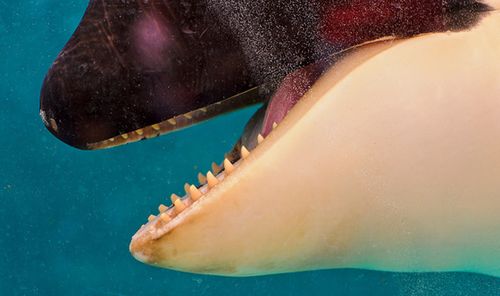
Nancy Black, a 49-year-old marine biologist and the co-owner of a whale watching operation in Monterey, California, has pleaded not guilty to charges that she was feeding killer whales during two filming expeditions. According to the , the government has also been investigating the Jean-Michel Cousteau Ocean Futures organization, which was filming in the same area at the same time, for its PBS show, The Gray Whale Obstacle Course. But the group has not been indicted. Black has worked as an expedition team member for the Jean-Michel Cousteau Ocean ���ϳԹ���s team.
The charges stem from incidents in 2004 and 2005. Black says that after a group of killer whales had killed a gray whale, she took some of the dead whale's blubber that was floating in the water and put a line through it, holding one end of the line so that the blubber would float in the water near the boat. She then filmed the orcas grabbing the blubber.��
Black says that tethering the blubber to the boat did not constitute feeding. But the federal government disagrees, saying her actions violated the , which prohibits feeding of marine mammals because it could interfere with their natural behaviors. ( on the Cousteau Ocean ���ϳԹ���s website shows Black holding onto a line with what appears to be blubber.)
��
Black told the San Jose that the case has not only torn her life apart but also impeded important research she was performing on the killer whales. Through a permit from the National Marine Mammal Laboratory, Black had been conducting biopsies on killer whales and observing their feeding patterns. In 2000, she found a link between declining Chinook salmon populations in the Pacific Northwest and changing killer whale migration patterns that brought them to the Monterey Bay. This spurned efforts to begin conservation efforts to protect killer whales.
“I was right at the level of getting very important data about toxic chemicals in killer whales,” she told the Mercury News.
The case, depending on its outcome, could also have a chilling impact on other research and conservation efforts that involve marine mammals. The Monterey Herald talked to marine mammal experts who find the charges overblown, and say they've seen government researchers doing the same thing that Black did in order to get close to the whales.
The paper also notes that Black is not universally loved in Monterey Bay, where some competing whale-watching operators accuse her of unethical behavior on the water: “cutting off other captains and speeding up on whales to give her passengers an up-close-and-personal experience.”
In addition to the two counts of chumming whales, the biologist is also charged with altering a 2005 video that federal investigators had requested as evidence in the case. A fourth charge says she then lied to investigators, saying she had not altered the video. These charges put her in much hotter water than the chumming charges, since they carry a maximum prison sentence of 25 years. She's not yet been arraigned on the video charges. She was released without bail after pleading not guilty to chumming charges.
— Mary Catherine O'Connor
Image: Flickr /
��